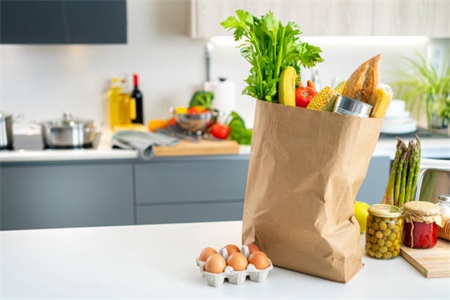The Benefits of Using Paper Bags for Food Packaging
Published on 2023/5/6

Share to:
The Benefits of Using Paper Bags for Food Packaging
In this article, we will explore the benefits of using paper bags for food packaging and why they are a great choice for businesses looking to go green.
In today's world, where environmental concerns are at an all-time high, businesses are increasingly looking for eco-friendly alternatives to traditional packaging materials. One such alternative that has gained popularity in recent years is paper bags. When it comes to food packaging, paper bags have proven to be a great choice for a number of reasons. Not only are they biodegradable and recyclable, but they are also cost-effective and versatile, making them a great option for businesses of all sizes. In this article, we will explore the benefits of using paper bags for food packaging and why they are a great choice for businesses looking to go green. From reducing waste to minimizing the carbon footprint, we will delve into the advantages that paper bags offer and how they can help businesses make a positive impact on the environment. So, let's dive in!
Environmental Benefits of Using Paper Bags
One of the main reasons why businesses are switching to paper bags for food packaging is their environmental benefits. Unlike plastic bags, paper bags are biodegradable and recyclable. This means that they can be easily broken down by natural processes and do not contribute to the growing problem of plastic pollution. In addition, paper bags are made from renewable resources, such as trees, which can be replenished through sustainable forestry practices. This makes paper bags a more sustainable choice compared to plastic bags, which are made from non-renewable resources and take hundreds of years to decompose.
Another environmental benefit of using paper bags for food packaging is that they can help reduce waste. Unlike plastic bags, which are often used once and then thrown away, paper bags can be reused multiple times before they need to be recycled. This not only reduces the amount of waste generated but also saves businesses money on packaging costs. In addition, paper bags are easier to recycle compared to plastic bags, which require special facilities to be properly recycled. This means that businesses can easily incorporate paper bags into their waste reduction strategies and contribute to a more sustainable future.
Health Benefits of Using Paper Bags
In addition to their environmental benefits, paper bags also offer health benefits for both consumers and businesses. Unlike plastic bags, paper bags do not contain harmful chemicals, such as bisphenol A (BPA), which has been linked to a number of health problems, including cancer and reproductive disorders. This makes paper bags a safer choice for businesses that want to ensure the health and safety of their customers.
Furthermore, paper bags are more breathable compared to plastic bags, which can help keep food fresher for longer periods of time. This is especially important in the food industry, where freshness and quality are key factors in customer satisfaction. By using paper bags, businesses can ensure that their food remains fresh and retains its quality, which can lead to increased customer loyalty and repeat business.
Cost-effectiveness of Using Paper Bags
Another advantage of using paper bags for food packaging is their cost-effectiveness. Unlike plastic bags, which are often more expensive to produce and dispose of, paper bags are a more affordable option for businesses. This is because paper bags are made from renewable resources, such as trees, which are abundant and readily available. In addition, paper bags can be recycled and reused multiple times, which can help businesses save money on packaging costs in the long run.
Furthermore, paper bags can be customized to meet the specific needs of businesses, which can help them stand out from their competitors. By adding logos, slogans, and other branding elements to their paper bags, businesses can create a unique identity that resonates with their customers. This can lead to increased brand recognition and customer loyalty, which can ultimately lead to increased revenue and profitability.
Durability of Paper Bags
Despite being made from lightweight materials, paper bags are surprisingly durable and can withstand a lot of wear and tear. This is because paper bags are made from high-quality materials that are designed to be strong and resilient. In addition, paper bags can be reinforced with handles and other structural features, which can make them even more durable and easier to carry.
Another advantage of using paper bags is that they are less likely to tear or puncture compared to plastic bags. This is because paper bags are made from thicker materials, which can withstand more weight and pressure. This makes paper bags a more reliable and secure option for businesses that want to ensure the safety and integrity of their products.
Versatility of Paper Bags for Branding and Advertising
One of the biggest advantages of using paper bags for food packaging is their versatility for branding and advertising. Paper bags can be customized in a variety of ways to reflect the unique identity and personality of businesses. This can include adding logos, slogans, and other branding elements that resonate with customers and create a memorable impression.
In addition, paper bags can be used to promote special offers, discounts, and other marketing campaigns. By printing promotional messages and calls to action on their paper bags, businesses can generate more interest and engagement from their customers. This can lead to increased foot traffic, sales, and revenue for businesses.
Types of Paper Bags for Food Packaging
There are several types of paper bags that businesses can choose from for their food packaging needs. These include:
Brown kraft paper bags: These are the most common type of paper bags and are often used for grocery and retail packaging. They are made from unbleached kraft paper and have a natural, rustic look.
White kraft paper bags: These are similar to brown kraft paper bags but are bleached to create a white color. They are often used for high-end retail packaging and gift wrapping.
Grease-resistant paper bags: These are designed to resist grease and moisture and are often used for food packaging. They are made from special materials that prevent grease and oil from seeping through the bag.
Laminated paper bags: These are paper bags that are coated with a layer of plastic or other materials to make them more durable and water-resistant. They are often used for heavy-duty packaging and shipping.
Tips for Choosing the Right Paper Bags for Your Business
When choosing paper bags for food packaging, businesses should consider several factors, including the type of food being packaged, the size and weight of the items, and the expected storage and transportation conditions. Here are some tips for choosing the right paper bags for your business:
Choose the right size: Make sure to choose paper bags that are the right size for your food items. This can help prevent waste and ensure that your products are properly packaged and protected.
Consider the weight and density of your items: If you are packaging heavy or dense items, make sure to choose paper bags that are reinforced with handles or other structural features.
Choose the right type of paper: Depending on the type of food being packaged, businesses may need to choose paper bags that are grease-resistant or laminated for added durability and protection.
Consider the environmental impact: When choosing paper bags, businesses should consider the environmental impact of their choices. Make sure to choose paper bags that are made from sustainable materials and can be easily recycled or composted.
Best Practices for Using Paper Bags for Food Packaging
To get the most out of their paper bags, businesses should follow some best practices for using them for food packaging. Here are some tips:
Store paper bags in a cool, dry place to prevent moisture and humidity from affecting their quality.
Do not overload paper bags with too much weight or too many items, as this can cause the bags to tear or rupture.
Make sure to properly label and store food items in paper bags to ensure that they are properly identified and stored.
Dispose of paper bags properly by recycling or composting them, depending on their materials and composition.
Conclusion
Overall, paper bags offer a number of benefits for businesses looking for eco-friendly alternatives to traditional packaging materials. From their environmental and health benefits to their cost-effectiveness and versatility for branding and advertising, paper bags are a great choice for businesses of all sizes. By following some best practices and choosing the right type of paper bags for their food packaging needs, businesses can make a positive impact on the environment while also meeting the needs of their customers.


 WhatsApp
WhatsApp
Send us your message
You can send an email asking for the price and detailed information of this product. We will reply you as soon as we receive your email